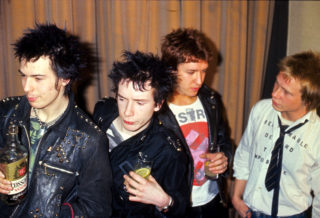The Sex Pistols’ movie is occasionally entertaining, but ultimately an inauthentic imposter
Andrew Anderson has been sitting through the movies make by band so you don't have to. Here's The Great Rock'n'Roll Swindle.

Andrew Anderson has been sitting through the movies make by band so you don't have to. Here's The Great Rock'n'Roll Swindle.
In 1977, The Sex Pistols were at the height of their notoriety. They’d written and recorded some riotous tunes, been signed to and shoved off two different record labels, and even called Bill Grundy a “fucking rotter” on TV. What better time, then, than to make a film about the band, capturing the charismatic craziness of Lydon, Jones, Malock, Cook and their orchestrated world? Malcolm McLaren, not a man adverse to honking his band’s own horn, took the idea to 20th Century Fox, and Who Killed Bambi? was born. Except it wasn’t, and this article is not about that film.
It should come as no surprise that 20th Century Fox pulled the project before it even got into proper production. Two days of filming took place – with softcore impresario Russ Meyer directing – before it all went, appropriately enough, tits up. Fun fact: the script was written by future film critic and Pulitzer Prize winner Roger Ebert, who published it online some years later (it’s probably still out there somewhere).
You see, the negative publicity, which McLaren had so cleverly (in his mind, at any rate) created, meant the Sex Pistols were an untenable proposition. Newspapers hated on them, promoters cancelled their gigs and patriotic piss heads beat them up in back alleys. A band that started out being fun suddenly turned serious – and that’s no fun at all.
It all came to an end in San Francisco, with Rotten’s final line “Ever get the feeling you’ve been cheated?” a fitting epitaph.
Well, it would have been, if McLaren had let the band split up rather than attempting to keep them going without Lydon. The result was a lot of posing, pretending and pissing money away. So with that thought in mind, ladies and germs, I give you the Sex Pistols film: The Great Rock and Roll Swindle.
The film is a mockumentary that centres on McLaren – not a good starting point – and the concept is that Steve Jones is a detective trying to track him down and find out what he’s done with all the dough. McLaren pops up throughout the film, often with his small penis out, where he expounds on how he turned a band that couldn’t play into punk sensations and the biggest and worst thing to hit Britain since the Black Death. These he humbly presents as a ‘10 Commandments’ of music management.
McLaren plays himself well: a unreformed, unrepentant arse-hole of quite staggering arrogance. No, it isn’t all that pleasant to watch him pontificate. And, no you’re not going to get an accurate picture of why the Sex Pistols were so good when they got it right. But yes, you will still be impressed by McLaren’s sheer scumbaggery. It is quite a feat to be stood with Johnny Rotten and Sid Vicious yet still come off as the unlikeable one.
The film takes a loose trip through the band’s history, from crappy early practice sessions to signing a record deal outside Buckingham Palace and sailing down the Thames to the tune of ‘God Save the Queen’ during Jubilee week. As I said, this is not the place to go for an accurate history of the band (for that try the Classic Albums documentary that is knocking around on YouTube), since the focus here is on McLaren-as-master-manipulator and singular reason for the band’s success. Of course, the real truth is that it was Lydon’s clever lyrics, Jones’ tight guitar playing, Cook’s solidity, Matlock’s songwriting and, yes, McLaren’s instinct for infamy, that made them such a short-lived but long-remembered band.
What I have written so far gives the impression that there is nothing worth watching here, which is wrong. There is a section where Cook and Jones visit Brazil and record several songs with Ronnie Biggs that is worth it for its I-can’t-believe-that-really-happened wonderfulness. There’s the famous bit where Sid performs a perfectly appalling version of ‘My Way’ before shooting the crowd – a sad foreshadowing of events soon to unfold for him. Even some of the McLaren-inspired bondage bits aren’t bad, like a rather funny guitar flagellation scene.
There are also some quite crap parts I’ve passed over. Clearly short on content and concept, the film makes extended use of the band’s music videos, along with some live cut before Lydon quit. This stuff is good for a single sitting, but it doesn’t half drag at feature film length. Some of the story is told through animated sequences that must have looked lazy and dated even in 1980 when the film was first released, let alone 40-odd years later.
So what can we learn from this piece of cinema? I think the main thing is that a punk spirit/attitude/ethos – call it whatever you want – isn’t much cop unless it is backed up by good art. The Sex Pistols might have been brash, brazen and on occasion truly tasteless, but they also made amazing music. For all McLaren prattling on how the band couldn’t play, the fact was they really could. And Lydon, bless his butter-loving soul, wrote the kind of clever lyrics most punk bands would pull out their Prince Alberts for. Without those songs, the kind of punk the Sex Pistols were pushing promptly becomes a pitiful parody.
Who Killed Bambi? could – and I stress could – have been a fantastic film; punk’s snotty retort to A Hard Day’s Night. Instead we’ve got an occasionally entertaining, but ultimately inauthentic, imposter. No doubt that is just what Malcolm McLaren wanted.